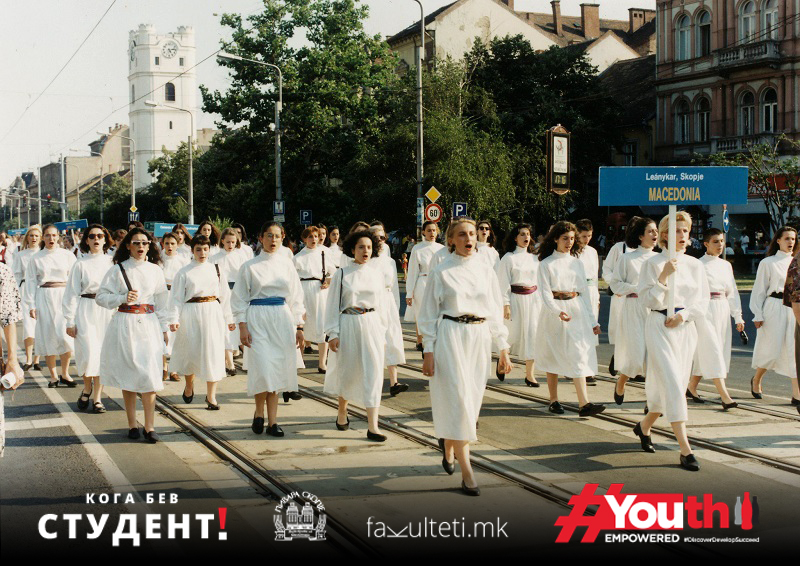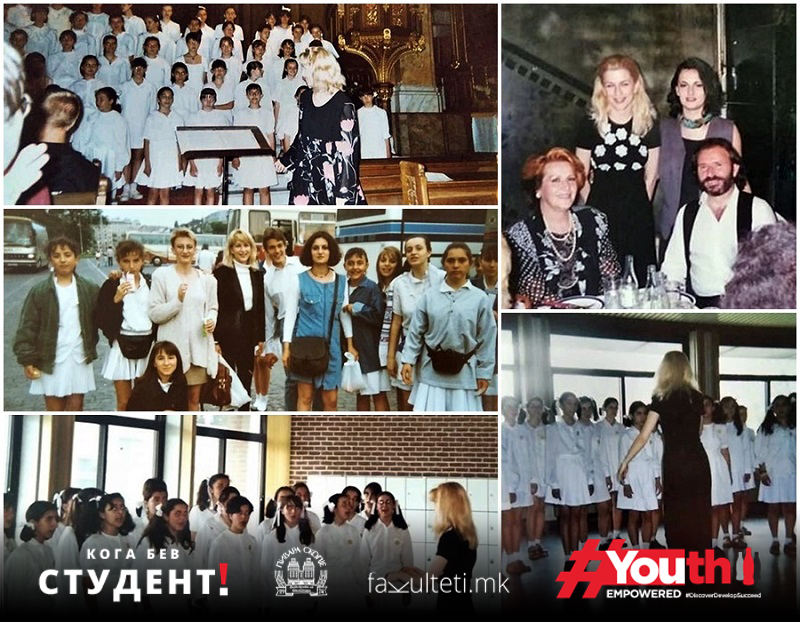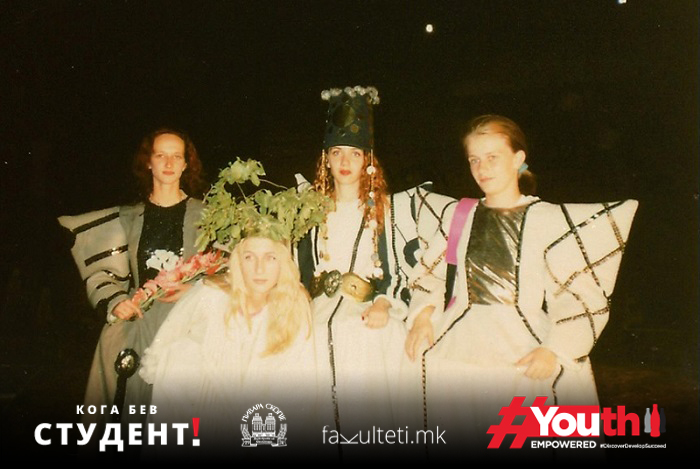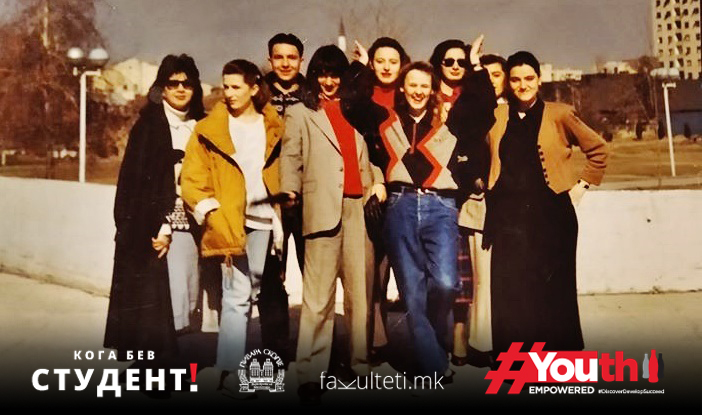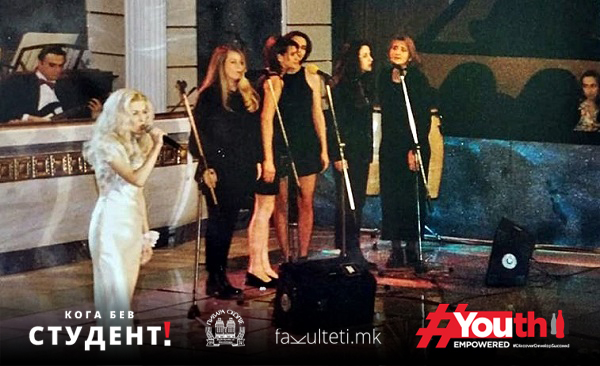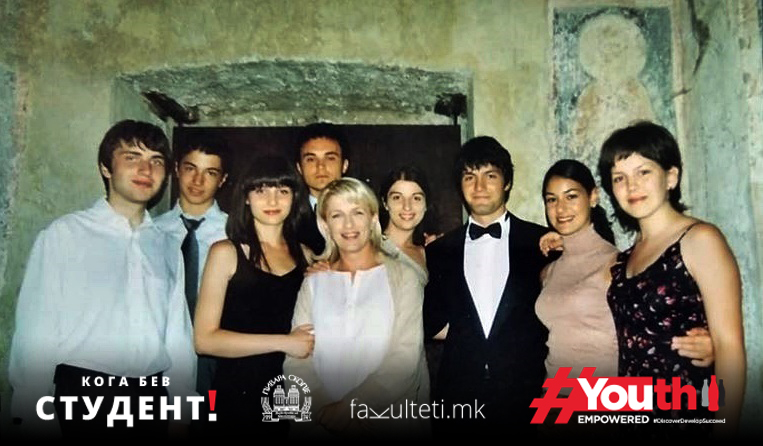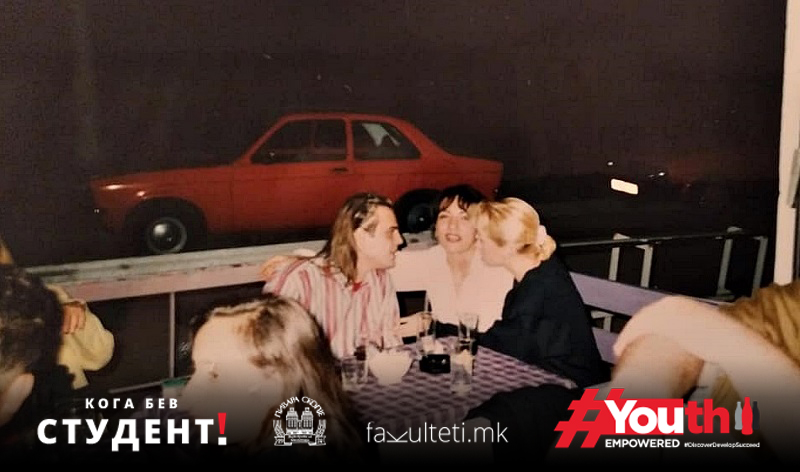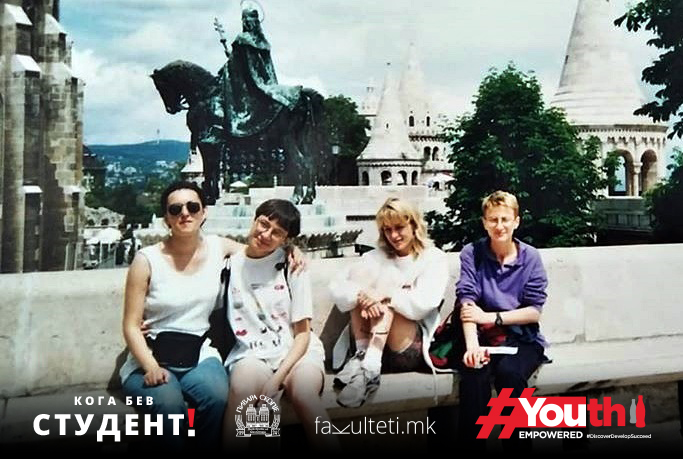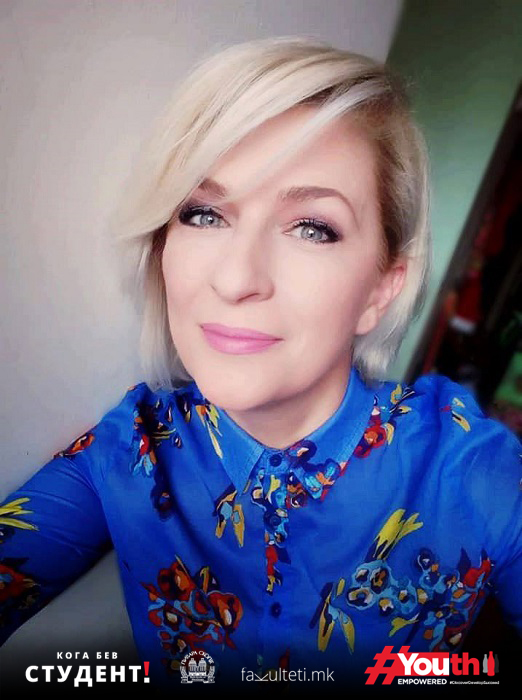























WHEN I WAS A STUDENT WITH BRANKA KOSTIC – MARKOVIC, ETHNOMUSICOLOGIST: I VOLUNTEERED AND EARNED MONEY AS PART-TIME EMPLOYEE FROM WHEN I WAS 16
I am proud with my diploma thesis. I researched the funeral customs in the country with emphasis on sad songs-Makedonskite tazhalenki-od Andromaha to Tsvezda Vidina” (Macedonian funeral songs-from Andromache to Tsvezda Vidina)-says our famous journalist and critic who shared her days as student in the series of articles that fakulteti.mk is working on together with Pivara Skopje
Art is her life-she grew up with music, literature and culture and all that she worked later on was related to art. Although there was no one in her family specifically dedicated to art, her parents supported her in realizing her aspirations and desires. Branka Kostic-Markovic is MA in ethnomusicology and finally, as of last year, after 20 years of work experience, she became the artistic manager of the folklore musical ensemble Tanec. She was a journalist and music editor at TV Telma for almost two decades, then she was editor at the publishing house Ars Lamina with which she is still working on the project Astrorum. She prepared for the musicology studies at the Faculty of Music Art in Skopje in 1990 but by recommendation of one of the professors, she enrolled to the new department-ethnomusicology.
She wished she would be enrolled at music school when she saw her friend Maja playing the piano and dancing ballet. Her parents took her to take the entrance test and she was accepted to learn to play the violin. She played the violin for six years but she knew even then that she did not want to be a performer but rather study the other side of music. This is why she enrolled high school at the department of theory of music and pedagogy.
-Those were days when we travelled a lot, we had different groups, everything was free and one could aim high with hard work. When the time came for me to enroll to high school I was considering the gymnasium, art school or music school. So, I opted for music school where at that time it was more important to know the general sciences so we studied physics and mathematics. I participated at the Macedonian Language Competition and I won the national first prize for an essay dedicated to St. Clement Ohridski. Perhaps at that time everyone believed that musicians are redundant and all the other art classes but today I realize that this was very important for our education and I am happy to have been part of the old, solid, Yugoslavia system-Branka explains.
She prepared for musicology
She knew she would not study just one instrument so she started getting ready for the musicology studies, a department on which only four students every fourth year were accepted. In her fourth year at high school at the music folklore class, held by the renowned ethnomusicologist Mihail Brzanov, she was noticed by the professor for her musicality and handiness in melography and he proposed that she should enroll in the new department at FMA that was supposed to start operating the next year.
Although she never had any close contact with folklore, she listened to her professor and took the entrance test at the department of ethnomusicology, headed by Prof. PhD Gjorgji Gjorgjiev. So she became a proud student of the first generation of ethnomusicologists in a group of three privileged candidates.
She says that her period in high school and at university and even her masters studies overlap, especially since the education took place in the very same building. She often finds herself confused not knowing which generation she belongs to or which colleague did she study with. At the faculty they had lectures with students from different departments, different universities even but also with professors from different departments, from Skopje, Belgrade and at masters, from England, Switzerland, the USA…
As the first generation of new studies they had many courses (from classics to several specialized courses, they had many tests and exams, used foreign more than domestic literature as reference and even worked with respectable professors from the region. According to Kostic this is a great privilege and main ace of her general education that on the other hand, opens a great many possibilities to work, in musicology and ethnomusicology, journalism and publishing…
-For example, we attended the philosophy courses together with the Faculty of Drama Art and the Academy of Art. I was interested in orchestras as music groups. It was exciting for me to dig deep into the phenomenon and analyze things, find an overlap in different branches and finally connect my love to language, art, exchange of experiences with people into one. It is well known that the most prestigious departments at the FMA were conducting, composition and (ethno) musicology, where very few people enrolled. It required for one to be the best, to have the best grades and to pass the most difficult exams. I do not say that the other performing departments were easy-but it took full dedication and luck to be ranked first in the sea of talented performers from across the world. It took to be the best of the best and not anyone can be SImon Trpcheski-says Kostic-Markovic.
She was fortunate enough to be taught by Prof. PhD Dragoslav Devic from Belgrade who is the author of the books that are still used in universities across the Balkan and without which the study of the folklore of south Slavic peoples cannot be conceived. Ethnochoreology was the lesson taught by Prof. PhD Olivera Vasic who is synonymous to this branch in this region.
Mix of many generations
At university different generations hung out. Vesna Gjinovska-Ilkova, Maja Shutevska and Ljubisha Kirovski, Borjan Canev, brothers Gjumar, Aleksandar Pop Hristov, Darko Dimitrov are only some of the people she spent her days with at university.
-There was a lot of individual teaching, there was selection too and the professors knew their students very well. In high school there were 40 students in my class, only 15 managed to graduate. At that time there were jazz clubs and gigs where we were able to get further education. Viktor and Viktorija for example (near St. Demetrius Shurch) was the place to be-we would go there after classes. Sanja and Vanja Nikolovski controlled our harmony assignments there and they helped us in analyzing the harmony of symphonies and operas. During the day there were classes there and in the evening, gigs. Choir and orchestra were taught in the afternoon hours and then we would go to a concert, an art exhibition of a gig. We knew who would be what since we were high school. We knew who Heidi Elzeser would become, Pande Shahov, Mihajlo Trendafilovski, Vesna Gjinovska (Ilkova), Simon Trpcheski, Ana Stamenkovska (present Durlovski), Blagoj Nacoski or Irena Veterova, Sandra Mijalkova, Olga Pando, Iskra Shukarova and others like them-she says.
Dedicated student
She was a very dedicated student to what was important to her and she also made some calculations by allowing herself to have not so good grades in courses she was not great at. But she always managed to maintain the high average grades.
-I did not keep myself from extending my knowledge in and outside of university. Practically we were attending lessons all day long, all day with music. At high school and then at university and postgraduate I was receiving the scholarship for talented individuals. For the classes I loved –I scored only 10. I took a peak in my student’s ID and I was filled with waves of pleasure and satisfaction when I remembered some of the exams I tool with some professors. And now, my high score-my10 in ethnomusicology, ethnoorganology, vocal technique, choir, music forms, philosophy and the aesthetics of music, history of music, sociology…are so very dear to me. But also the harmony exercises we took with Prof. Zhivojin Glishic (teaching assistant at the time)-grade 6 with him was equal to grade 9 with other professors-he was really strict-asserts our guest.
She says that she was not a nerd because her living dynamic could make this possible. –I wanted to do all things possible at the same time. I was volunteering and I started earning my part –time wage when I was 16. While I was studying I was constantly attending Maestro Zaprov’s choir at the Home for Youth 25 Maj where I was preparing my discipline and dedication to my work but I also acquired the practice to accomplish top results and handle the results. During my studies together with some of my colleagues I worked as part-time employee at the Skopje Jazz Festival where I met so many stars such as BB King, Billy Cobham, Al Di Meola, Joe Zawinul, Roy Hargrove….I wanted to enjoy and be part of the process of such an amazing music event, from the arrival of the stars until their departure from the country. At that time all my time was filled with music, classic on concerts at the Philharmonic and rock and roll and jazz gigs-Branka reminisces.
Funeral songs-Diploma thesis
Her diploma thesis was done on a very interesting topic that was proposed by Prof. Gjorgjiev. She conducted research on funeral customs in our country, with emphasis on sad songs-Makedonskite tazhalenki-od Andromaha to Tsvezda Vidina” (Macedonian funeral songs-from Andromache to Tsvezda Vidina). She researched Skopska Crna Gora most, v. Kuchevishte.
-Rarely anyone wants to work with the funeral songs and I only had one not so big essay from Vasil Hadzimanov who wrote about the sad songs on funerals for the victims of the great earthquake in Skopje in 2963. It was very difficult for me to conduct the on-site research. My father and I found a professional funeral song singer in Kucheviste. But she did not want to sing until someone from the village dies so that she can use his/her name. Then she did not wish to sing outside of the funeral ceremony and I wanted to record all the conditions in which the deceased is mourned-before the funeral, at the funeral, on the first day, 7 days until one year)-so we had to be in the basement of a school to avoid neighbors from hearing us otherwise it would be considered heresy. These songs are a taboo worldwide and stand as direct testimonial to the oldest layers of folklore tradition. I am proud with my thesis with which I managed to create an entire history of mourning-says the ethnomusicologist.
Love for the Macedonian Language
One of her favorite high-school professors was the harmony and choir professor, Tode Novachevski.
-Although harmony was a subject I did not really dedicate much of my time in high school and university, it was a that sort of subject that I was not really good at, later on I ended up loving the subject and truly learning what harmony analysis and music forms mean all because this class was taught by Prof. Tode Novachevski, the famous composer, known to the public as the creator of the hit of the sisters Marijana and Rosana. He was an incredibly modest and quiet person, full of knowledge and extraordinary musicality in his life as a professor and as composer. The respect I hold for him is very deep and I was happy that after many years of no communication he recently wrote me on Facebook (he moved to Australia a while back) saying that I was one of his students that he will never forget-she says.
Another one of her favorite university professors is the former dean and vocal technique professor, the famous opera artist Blagoja Nikolovski. He was able to sing opera arias for the first time because until then her experience was only with choir composing. She got the first straight A from him. She wanted to do solfeggio with Blagoj Canev but she will also never forget the knowledge she acquired from Mile Brzanov and the solfeggio professor Nada Gajic who was really strict and of whom everyone was afraid. Our ethnomusicologist shared with us that the lessons for good conduct they got from their teachers and professors were very important. At that time, she says, we would be sent home if we had worn shorts or if we had not showered before we got to classes. And she believes that this is correct because the future musicians should be an example for reputation in society.
She was very lucky as a good and curious student to be included for her masters studies on an international project at FMA supported by the Zurich Science Foundation. Prof. Dimitrije Buzharovski had hired her for the digitalization of Macedonian music folklore and in the frame of this project she prepared her masters thesis dedicated to the creation of methodology for modern archiving (in the domain of digital technology) of music folklore on the basis of the private collection that the first Macedonian ethnomusicologist Zhivko Firfov had created. This was a remarkable experience intertwined with cooperation with globally renowned scientists, participation of international conferences and presentations of top universities. A proof that all the seemingly unimportant classes in high school become crucial in handling signals, waves and spectral analyzing of sound, statistic databases, information, quantification of works that are mainly considered unexact etc.
Skopje Jazz Festival-great behind-the-scenes experience
Her work done at the Skopje Jazz Festival is characterized with years well spent because they were helping the organization of the festival and accompanied the important guests…
-I learned there that what is most important is the work of art and not the author or the performer in private. Still, top artists are very simple and I have never encountered any problems with them. For the ones that are some levels lower, in the shadows of the first league artists one can immediately sense their frustration. And even today I am very happy when I do an interview with a star and when she/he starts talking with prejudice that I am from some quasi country and then during the interview I manage to persuade them that they are not right-my satisfaction doubles then-laughs Branka and added that Al Di Meola was a big disappointment for her when it comes to artists but that she would always remember the wonderful interviews and meetings with Carreras, Zubin Mehta, Tord Gustavsen, Esa Pekka Salonen, Kristjan Järvi and others like them.
But what I will never forget is the world renowned drummer Billy Combham who was supposed to have a concert in Skopje with his band. Two of his musicians had a car accident and did not travel to Skopje but Cobham still did not cancel the concert.
-A world renowned artist can afford to cancel their concert but Cobham sees concerts as sacred, regardless of whether he is performing in Skopje or New York. I was responsible for his stay here in the country during the festival. He was very worried about what happened (luckily his musicians’ injuries were not that serious) and he was looking for an alternative solution to the concert that was scheduled to happen the next day. He just said to me: Please, just get me a piano. He was writing songs for a trio all night long in the hall of the hotel Continental and managed to find a contrabass musician he had performed with earlier and did a historic concert in Skopje-in the toughest formation-Trio. He is a true professional, in Macedonia and everywhere-she said.
She also says that she was impressed by B.B. King who was a true gentleman for not allowing her to stand while he was signing her poster but ordered people to immediately bring a chair because “good manners dictate that a lady must be seated so that she can get the attention she deserves”.
Kostic-Markovic ventured into journalism thanks to her university
-When Telma was established in 1996, Drako Markovic was the director of the television and intended to make it artistic. Vladimir Mandichevski, then editor employed by the television called Prof. Goce Kolarovski and requested for a student to be recommended that could work on the TV show in the field of opera. While I was studying Prof. Kolarovski was an assistant and then became a professor. He was impressed with my graduate thesis and recommended me. This is how my story at Telma started and I was there for almost two decades, climbing the stairs to get to the position as music editor. To have a director and also a chief responsible editor like Risto Lazarov, representative of the old and good age of journalists and editors meant that one would be able to gradually and healthy progress in their career, without jumping any steps-says Kostic-Markovic who was working at this television until 2016 when all the editors of the cultural sector were declared redundant employees.
Two PhDs without presentation
Her show had put attention to every individual that means something in the world of music. She is pleased that she had the possibility to follow many of today’s renowned instrumentalists, vocal artists, composers and conductors. She worked as a professor for three years at the newly established University of Goce Delcev in Stip. She had attended symposiums where she met her husband who is also an ethnomusicologist from Belgrade. Although she had enrolled for PhD studies two times, her professional and living activities prevented her from completing her PhD studies.
-I did not complete my first PhD because of the problems I had after completing the international project at FMA that I already discussed when I pointed out what kind of scientist I wanted to become and the second time, at the Institute of Folklore, at the time when I was about to finally settle and present my second PhD I was faced with the challenge called motherhood. Everything in life happens for a reason and it is never too late. If I decide to do this I will do it with the third attempt. To me learning comes naturally and challenges are what keep me young at heart-laughed Kostic-Markovic.








